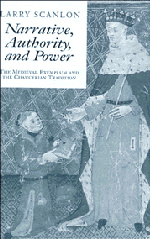Book contents
- Frontmatter
- Contents
- Acknowledgments
- INTRODUCTION: EXEMPLARITY AND AUTHORITY IN THE MIDDLE AGES
- 1 Chaucer's Parson
- 2 Redefining the exemplum: narrative, ideology, and subjectivity
- 3 Auctoritas and potestas: a model of analysis for medieval culture
- PART 1 THE LATIN TRADITION
- PART 2 THE CHAUCERIAN TRADITION
- Bibliography
- Index
1 - Chaucer's Parson
Published online by Cambridge University Press: 16 September 2009
- Frontmatter
- Contents
- Acknowledgments
- INTRODUCTION: EXEMPLARITY AND AUTHORITY IN THE MIDDLE AGES
- 1 Chaucer's Parson
- 2 Redefining the exemplum: narrative, ideology, and subjectivity
- 3 Auctoritas and potestas: a model of analysis for medieval culture
- PART 1 THE LATIN TRADITION
- PART 2 THE CHAUCERIAN TRADITION
- Bibliography
- Index
Summary
I begin this study of narrative and authority where Chaucer ends: with the Parson. The Parson's Tale, and the Retraction which follows it, constitute the last and most definitive of a series of moments in the Canterbury Tales where Chaucer's self-conscious and apparently insatiable appetite for narrative complexity gives way to an affirmation of a dominant form of medieval authority. Previous scholarship has tended to deal with this dilemma by privileging one side of the opposition or the other – arguing either that Chaucer's narrative complexity subverts, or at least holds at a distance the simple verities of medieval authority, or, conversely, that his complexity can be reduced to these verities after all. The dilemma took its purest and most contended form in the formalist/patristic debates of the fifties and sixties. While Chaucer Studies have moved beyond these debates, this opposition they assumed – that is, between the complexity of the textual and the simplicity of authority – continues to structure the field. The goal of this study is to move the field beyond this opposition as well, by means of a reexamination of the medieval exemplum and its role in four major works of the Chaucerian tradition: the Canterbury Tales, Gower's Confessio Amantis, Hoccleve's Regement of Princes, and Lydgate's Fall of Princes.
As many other scholars have argued, this narrative form dominated later medieval culture, particularly in England. Its dominance raises a number of interrelated questions.
- Type
- Chapter
- Information
- Narrative, Authority and PowerThe Medieval Exemplum and the Chaucerian Tradition, pp. 3 - 26Publisher: Cambridge University PressPrint publication year: 1994
- 1
- Cited by



